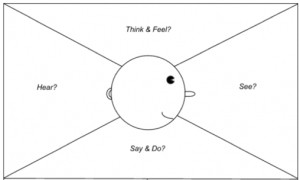One of the top global healthcare challenges is providing evidence-based care; however, studies consistently show that 70% of what clinicians do is not based on evidence (AHRQ, 2015), with only a slight improvement in the most recent 2019 report. This problem demonstrates the gap between the availability of evidence-based recommendations and their application, which is linked to poor health outcomes. The challenges of translating evidence into practice are well-known, ranging from clinicians’ inability to attend education sessions (due to busy work schedules and staffing shortages) to researchers failing to present findings in a way that is engaging, informative and reflective of real-world clinical contexts. Inspired to provide more effective knowledge translation resources, we will be creating personas (i.e., hypothetical representations) with older adults with cancer to convey different stages and aspects of their health journey.
 The goal of creating the personas is to learn – based on patients’ point of view – what their personal experiences are, moving through the categories from thinking through hearing, which in turn will help create a degree of empathy in caring for patients. Our previous study suggests the use of personas can help to clarify assumptions and give clinicians and the healthcare team a better understanding of the desires, motivations and behaviours of patients for developing effective knowledge translation tools (Kwon et al., 2014). In this project, we aim to develop personas through a series of online workshops with patients (N = 18). We anticipate that the personas will not only be used as important communication tools for clinicians in making cancer care decisions but also raise awareness of patients’ unique personal, social and structural needs.
The goal of creating the personas is to learn – based on patients’ point of view – what their personal experiences are, moving through the categories from thinking through hearing, which in turn will help create a degree of empathy in caring for patients. Our previous study suggests the use of personas can help to clarify assumptions and give clinicians and the healthcare team a better understanding of the desires, motivations and behaviours of patients for developing effective knowledge translation tools (Kwon et al., 2014). In this project, we aim to develop personas through a series of online workshops with patients (N = 18). We anticipate that the personas will not only be used as important communication tools for clinicians in making cancer care decisions but also raise awareness of patients’ unique personal, social and structural needs.
Our team is supported by the UVic Human & Social Development grant in partnership with BC Cancer and the Jamie Cassels Undergraduate (JCURA) Award. We plan to provide updates at the JCURA Student Fair in March 2022 and the UVic Research Dialogue Series on June 6th 3:30 to 5:00 pm. Stay tuned!
References
Agency for Healthcare Research and Quality. 2014 national healthcare quality and disparities report (AHRQ Publication No. 15-0007). Rockville, MD: US. Department of Health and Human Services; 2015 Retrieved from 2014 National Healthcare Quality & Disparities Report | AHRQ Archive
Kwon, J.-Y., Phillips, C., & Currie, L. M. (2014). Appreciating the Persona paradox: Lessons from participatory design sessions with HIV+ gay men. Studies in Health Technology and Informatics, 201, 133–139
Recent Comments